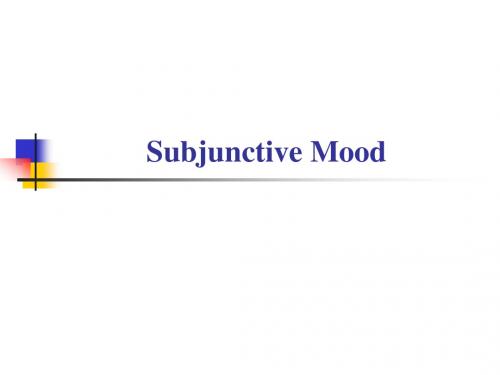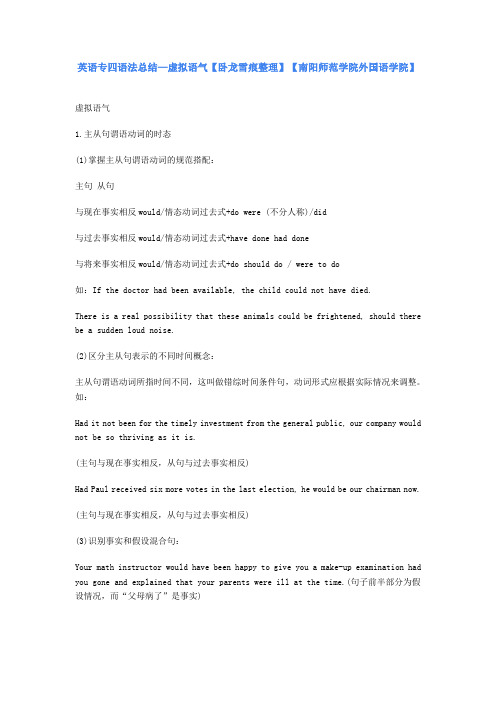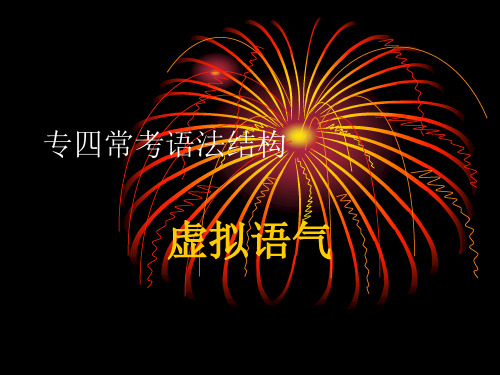专四语法第13节-虚拟语气
专四语法精讲-虚拟语气(内部资料)

if only和would that后用虚拟语气:谓语 动词用一般过去时表示现在没有实现的 的愿望,用过去完成时表示过去没有实 现的愿望,常译为“要是….就好了”。 例如:If only she had known where to find you. Would that I had seen her before she died. 在她死前我能见她一面就好了
Subjunctive Mood
虚拟条件句
条件从句 与现在事实相反 If I (we, you, he, she, it, they)+ 动词过去式(be动词的过去式 一律用were) 与过去事实相反 If I (we, you, he, she, it, they) + had +过去分词 If I (we, you, he, she, it, they) +would have +过去 分词 与将来事实相反 A式:一般过去式 B式:were +不定式 C式:should + 动词原形 Would (should) +动词原 形 结果主句 I (we, you, he, she, it, they) + would +动词原形
What would people say about him, whose wife should take bribes?
要是他的妻子接受贿赂的话,人们会怎样说他呢? (定语从句)
含蓄条件句:有些句子中,没有任何表 示虚拟语气的词、短语或从句,但仍要 用虚拟语气。这是要么是省略了表示虚 拟语气的部分,要么隐含在上下文中, 称为含蓄条件句。 例如:I would do anything for you. (if I could)
专四语法 可可英语

专四语法可可英语好的,以下是一篇有关可可英语专四语法的文章:可可英语专四语法精讲一、虚拟语气虚拟语气是英语语法中一个非常重要的部分,在专四考试中也是必考的知识点。
虚拟语气用来表示与实际情况相反的情况或者表达主观上的愿望、建议、猜测等。
虚拟语气的用法包括与现在事实相反、与过去事实相反和与将来事实相反三种情况。
1. 与现在事实相反:使用动词的过去式(be动词用were),从句使用would+动词原形。
例如:If I were you,I would choose to study abroad.(如果我是你,我会选择出国留学。
)2. 与过去事实相反:使用“would+have+过去分词”,从句使用“had+过去分词”。
例如:If we had known the answer,we would have told you.(如果我们知道答案,我们早就告诉你了。
)3. 与将来事实相反:使用“would+动词原形”,从句使用“were+to+动词原形”或者“should+动词原形”。
例如:If it were to rain tomorrow,the football match would be postponed.(如果明天下雨,足球比赛就会被推迟。
)二、定语从句定语从句是英语语法中的另一个重要知识点,也是专四考试的重点。
定语从句用来修饰名词,通常放在所修饰名词之后。
引导定语从句的关联词包括that、which、who、whose等。
1. 使用that的情况:当先行词为all、something、nothing、this等不定代词时,或者先行词被形容词最高级修饰时,多用that引导定语从句。
例如:This is the most interesting book that I have ever read.(这是我读过的最有趣的书。
)2. 使用which的情况:当引导词前面有逗号或放在句末时,通常使用which。
英语专四语法总结—虚拟语气【卧龙雪痕】

英语专四语法总结—虚拟语气【卧龙雪痕整理】【南阳师范学院外国语学院】虚拟语气1.主从句谓语动词的时态(1)掌握主从句谓语动词的规范搭配:主句从句与现在事实相反would/情态动词过去式+do were (不分人称)/did与过去事实相反would/情态动词过去式+have done had done与将来事实相反would/情态动词过去式+do should do / were to do如:If the doctor had been available, the child could not have died.There is a real possibility that these animals could be frightened, should there be a sudden loud noise.(2)区分主从句表示的不同时间概念:主从句谓语动词所指时间不同,这叫做错综时间条件句,动词形式应根据实际情况来调整。
如:Had it not been for the timely investment from the general public, our company would not be so thriving as it is.(主句与现在事实相反,从句与过去事实相反)Had Paul received six more votes in the last election, he would be our chairman now.(主句与现在事实相反,从句与过去事实相反)(3)识别事实和假设混合句:Your math instructor would have been happy to give you a make-up examination had you gone and explained that your parents were ill at the time.(句子前半部分为假设情况,而“父母病了”是事实)I would have gone to visit him in the hospital had it been at all possible, but I was fully occupied the whole of last week.前半部分为假设,后半部分是事实)2.名词性从句的虚拟形式名词性从句是指宾语从句、主语从句、表语从句和同位语从句。
英语四级高级语法讲解:虚拟语气

英语四级高级语法讲解:虚拟语气虚拟语气是说话者用来表示假设,或难以实现的情况,而非客观存在的事实,所陈述的是一个条件,不一定是事实,甚至完全与事实相反。
下面是作者整理的英语四级高级语法讲解:虚拟语气,欢迎大家阅读学习。
引导的虚拟语气2.倒装形式Were I you(=if I were you),I would get up early in the morning.Had you arrived at the station ten minutes earlier yesterday(=If you had arrived…),you could have caught the train.Should it rain(=If it should rain),the crops would be saved.It is time that ...Would rather that.....(1)I would rather he came tomorrow than today.(2)John would rather that she had not gone to the party yesterday evening.(3)I would rather everything hadn t happened in the past.“It is(was)+形容词(或过去分词)+that……”结构中的虚拟语气is necessary that we(should 可省略,下同)have a walk now.was necessary that we(should) make everything ready ahead of time.is required that nobody(should) smoke here.is important that every pupil(should) be able to understand the rule of school.练习’ll be busy this he ___ free,he ___ to the cinema with you.to be; might go going to be; will gobe; might have gone ; will goEdison died,it was proposed that the American people _____ all power in their homes,streets,and factories for several minutes in honor of this great man.off offturn off turned offI known her name,_____.does she know mine? where does she live?would have invited her to lunch would be beautiful’d rather you ______ by train,because I cant bear the idea of your being in an airplane in such bad weather.go gogonevictim ________(本来会有机会活下来) if he had been taken to hospital in time.would have a chance to survive(翻译)professor required that ________(我们交研究报告)。
专四——虚拟语气

在表示命令、建议或要求等动词后的宾语从句中要 求用虚拟语气,从句谓语形式 :should+ 动词原 形。
It is +形容词/名词/过去分词/+that引导的主语从 句,从句谓语形式 :should+ 动词原形。
Lest, in case, for fear that”以防,万一”引导目 的状语从句常用虚拟语气,从句谓语形式: should+ 动词原形。 Lest, for fear that从句中 should可省去, in case从句中should通常不省 去
4.在wh-ever, however ,no matter,等引导的让步状语从句中,从句虚拟语气的结构为: may+ 动词原形 (指现在或将来)或 may+完成式(指过去),主句结构不限。
Should/would/could/might+ have+过去分词
Should/would/could/might+ 动词原形
省略if虚拟条件句的用法 在虚拟条件句中,如果从句中含有were,had,或should等词时,可将if省略,把were,had或should
等提到主语之前,引起倒装。
Eg: Had you not helped me, I should have failed.
虚拟语气
副标题
If非真实条件句中的基本用法
假设类型 与现在事实相反
与过去事实相反
与将来事实相反
条件从句谓语动词形式 一般过去式(be用were)
Had+过去分词
动词过去式,(should+)动词 原形,were ld/could/might+ 动词原形
其他句型虚拟语气
专四语法第13节-虚拟语气

第十三节虚拟语气虚拟语气是谓语动词的一种特殊形式,用来表达假设、主观愿望、猜测、建议、可能或纯粹的空想等非真实情况。
一if非真实条件句中的虚拟语气1.if非真实条件句的基本用法由if引导的非真实条件句表示对现在、过去、将来的事实进行假设时,主句与从句中谓语动The victim would have had a chance to survive if he had been taken to hospital in time.遇难者如果及时送往医院,他本来就有机会活下来的。
(与过去事实相反)If I knew his telephone number,I would tell you.如果我知道他的电话号码,我会告诉你。
(与现在事实相反)If there should be a heavy snow next Sunday,we would not go skating.如果下周日下大雪的话,我们就不去滑冰了。
(表将来)[专四真题] I f there were no subjunctive mood, English ______ much easier to learn.could have been B. would be C. will be D. would have been译文:如果没有虚拟语气,英语学习起来就会更容易了。
分析:本题表示与现在事实相反的假设。
表现与现在事实相反,条件从句用一般过去时,主句使用should(would)+动词原形,故B为答案。
A项could have been 是对过去事实的假设,与从句所表示的现在事实不吻合;C项will be 不可以用于虚拟语气中;D 是与过去事实相反的假设的虚拟语气从句形式。
2.省略if的虚拟条件句的用法在虚拟条件句中,如果从句中含有were, had或should等词时,可将if省去,把were, had 或should等提到主句之前,引起倒装。
专四常考语法结构3虚拟语气

If only the committee __ the regulations and put them into effect as soon as possible A approve B will approve C can approve D would approve D 注意:当if only后的句子表示与现在或将来事实 相反,该用动词过去式来表示虚拟语气,而选 项中又没有时,可以采用这种形式:would + 动词原形。
• I insist that we_______ (go) there by bus. • He susggested that we _________ (leave) early. • The judge ordered that the prisoner________ (be) sentenced to 30 days in jail.
• I wish I were as tall as you. 我 希望和你一样高。 He wished he hadn’t said that. 他希望他没讲那样的话。 I wish it would rain tomorrow. 我希望明天下雨就好了。
• 2)Wish to do表达法。 Wish sb / sth to do I wish to see the manager. = I want to see the manager. I wish the manager to be informed at once. (= I want the manager to be informed at once.)
错综时态的虚拟语气
• 错综时态的虚拟语气即指主句和从句在 表达是与什么时态的事实相反上并不一 致(比如主句要表达与现在事实相反而 从句要表达与过去事实相反),这种情 况要采用“对号入座”的方法来处理, 即主从句结构分别采用与其表达时态对 应的结构。Eg.
专四语法虚拟语气只是课件

与过去事实相反
动词的过去完成式(had 动词的过去分词)
+
might) + have + 的过去分词
动词
1.动词的过去式(be 为 Would (should,re + 不定式
might) + 动词原形
3. should + 动词原形
7
一.考点分类 - 从句省略连词if的虚拟语气
A. If, had
B. Have, had
C. Should, have D. in case, had
[C]
9
一. 考点分类 - 从句省略连词if的虚拟语气
1. be动词were提到从句主语的前面。 • Were I you, I would take an umbrella with me. • There is a real possibility that these animals
[B]
注:省略if倒装,时态用过去完成时;主句的时间副 词是now, 但是事实上该考试成绩已经出来了,所 以用B。
8
一. 考点分类 - 从句省略连词if的虚拟语气
真题举例及分析
例2: ______ you ______ further problems with your printer, contact your dealer for advice. (2005:63)
C. was
D. were
[A]
14
例2:If only the patient______ a different treatment instead of using the antibiotics, he might still be alive now.(2007:54) A. had received B. received C.should receive D.were receiving
- 1、下载文档前请自行甄别文档内容的完整性,平台不提供额外的编辑、内容补充、找答案等附加服务。
- 2、"仅部分预览"的文档,不可在线预览部分如存在完整性等问题,可反馈申请退款(可完整预览的文档不适用该条件!)。
- 3、如文档侵犯您的权益,请联系客服反馈,我们会尽快为您处理(人工客服工作时间:9:00-18:30)。
第十三节虚拟语气虚拟语气是谓语动词的一种特殊形式,用来表达假设、主观愿望、猜测、建议、可能或纯粹的空想等非真实情况。
一if非真实条件句中的虚拟语气1.if非真实条件句的基本用法由if引导的非真实条件句表示对现在、过去、将来的事实进行假设时,主句与从句中谓语动词的形式可以分为以下三类:The victim would have had a chance to survive if he had been taken to hospital in time.遇难者如果及时送往医院,他本来就有机会活下来的。
(与过去事实相反)If I knew his telephone number,I would tell you.如果我知道他的电话号码,我会告诉你。
(与现在事实相反)If there should be a heavy snow next Sunday,we would not go skating.如果下周日下大雪的话,我们就不去滑冰了。
(表将来)[专四真题] If there were no subjunctive mood, English ______ much easier to learn. could have been B. would be C. will be D. would have been译文:如果没有虚拟语气,英语学习起来就会更容易了。
分析:本题表示与现在事实相反的假设。
表现与现在事实相反,条件从句用一般过去时,主句使用should(would)+动词原形,故B为答案。
A项could have been 是对过去事实的假设,与从句所表示的现在事实不吻合;C项will be 不可以用于虚拟语气中;D 是与过去事实相反的假设的虚拟语气从句形式。
2.省略if的虚拟条件句的用法在虚拟条件句中,如果从句中含有were, had或should等词时,可将if省去,把were, had或should等提到主句之前,引起倒装。
如果句中没有were, had或should等,则不能省略if,也不能用倒装结构。
[专四真题] _____for the fact that she broke her leg, she might passed the exam. Had it not been B. Hadn’t it been C. Was it not D.W ere it not译文:要不是因为摔断了腿,他或许已经通过了考试。
分析:由于主语从句使用了might have done 结构,说明此句表示的内容与过去事实相反,故条件状语从句中应该使用had done 结构。
若要将虚拟条件句中的连词省去,则需将助动词提到主语前面,否定词位置不变,因此A项Had it not been 为正确答案。
3.错综时间虚拟条件句有些时候,条件从句表示的动作和主语表示的动作发生在不同的时间,比如一个是过去发生的,一个是现在发生的。
这时,主句和从句的谓语动词要根据自己所指的不同时间选用适当的虚拟形式。
如:If they had invited me, I would go with them now. 如果他邀请过我,我现在就和他们一起走了。
[专四真题]____if I had arrived yesterday without letting you know beforehand? A.Would you be surprised B.Were you surprisedC. Had you been surprisedD. Would you been surprised 译文:如果我昨天不事先打招呼就来了,你会觉得吃惊吗?分析:这是一个错综时间虚拟条件句。
从句是对过去事实的假设,而主句问的是回答者现在的感受,因此主句应该为Would you be surprised,答案为A。
二介词或介词短语表示虚拟条件有些介词或介词短语隐含条件之义,其虚拟形式与if引导的非真实条件状语从句类似,需根据从句所用的时态,来选择主句的谓语形式。
这些词包括:without(没有),but for(要不是),in the absence of(如果没有),were it not for(要是没有),but that(若不是)等。
But for their help, we could not have finished the work on time.要不是他们的帮助,我们就不可能按时完成那项工作。
(表过去)Without electricity, there would not be modern industry.没有电,就没有现代工业。
(表现在)In the absence of gravity,there would be no air around the earth.如果没有重力,地球周围就没有空气。
(表现在)三宾语从句中的虚拟语气1.wish引导的宾语从句中的虚拟语气主要形式为:表示对现在的假设时,从句的谓语动词为一般过去式(be动词用were)。
表示对过去的假设时,从句的谓语动词为“had+过去分词”或“could/would have+过去分词”。
表示对将来的愿望时,从句的谓语动词用“would/could/might+动词原形”。
Sometimes I wish I lived in a different time and a different place.有时候我希望自己生活在一个不同的时间和空间里。
(表现在)I wish I were as strong as you.我希望像你一样健壮。
(表现在)He didn’t go to the party, but he does wish he had been there.他没有去舞会,不过他很希望自己当时在那里。
(表过去)I wish prices would come down.我希望物价能降下来。
(表将来)2.had hoped表示过去没有实现的愿望,意为“本来想要,但愿”,其后的宾语从句用“would+动词原形”表示虚拟。
I had hoped that I wouldn’t bore you by talking about my children. 但愿我谈论我的孩子没有使你厌倦。
3.would rather, would sooner, would just as soon, might as well, would prefer之后的宾语从句用虚拟语气表示愿望,意为“宁愿”,“但愿”。
表示对现在或将来的愿望:would rather/sooner+主语+动词过去时(be动词用were);表示对过去的愿望:would rather/sooner+主语+动词过去完成时。
I would rather I had not gone to the party yesterday evening.要是我昨天晚上没有去参加那个晚会就好了。
(表过去)I would rather/sooner you came tomorrow.我宁愿你明天来。
(表将来)4.在表示命令、建议或要求等动词后的宾语从句中要求用虚拟语气,谓语形式为“(should)+动词原形”。
这类动词有:ask(要求),advise(建议),suggest (建议),request(请求;要求),commend(推荐),decide(决定),determine (决定),insist(坚持认为),intend(打算),prefer(更喜欢;宁愿),propose (提议),order(命令),recommend(推荐),imagine(想象)等。
I suggested that you (should)try to understand him.我曾建议你试着去理解他。
They demanded that the aggressor troops (should) be withdrawn immediately.他们要求立即撤出侵略军。
【专四真题】My boss ordered that the legal documents______ to him before lunch. be sent B.were sent C.were to be sent D.must be sent译文:我老板下令午饭前必须交给他那些法律文件。
分析:若主句谓语动词为suggest, demand, order, propose, request等表示建议、要求、命令等语气的动词,后面的宾语从句要用虚拟语气,谓语动词用“(should+)动词原形”,因此选A。
四主语从句中的虚拟语气虚拟语气用于主语从句的常见结构是“It is+形容词/名词/过去分词+that引导的主语从句”,主语从句的谓语动词为“(should)+动词原形”。
适用此结构的词包括:形容词:advisable(可取的,明智的),appropriate(适当的),desirable(想要的),essential (必需的),fundamental(基本的),imperative(命令的),important(重要的),necessary (必要的),proper(适当的),urgent(紧急的,急迫的),vital(至关重要的)等。
名词:a pity(可惜),a shame(耻辱;羞愧),no wonder that(难怪)等。
过去分词:arranged(安排,计划),desired(渴望),requested(请求),suggested (建议),recommended(推荐),required(必需),demanded(要求)等。
It is essential that these application forms(should)be sent as early as possible.重要的是把这些申请表尽早寄出去。
It is highly desirable that a new president(should)be appointed for this college.大家非常希望一位新校长来管理这所大学。
【专四真题】It is imperative that the government______more investment into the shipbuilding industry.A. attractsB. shall attractC. attractD. has to attract译文:势在必行的是,政府应该在船坞制造业吸引更多的投资。
分析:It is imperative that…表明that从句需要使用虚拟语气,其形式为“should+动词原形”,其中should可以省略,故答案为C。
